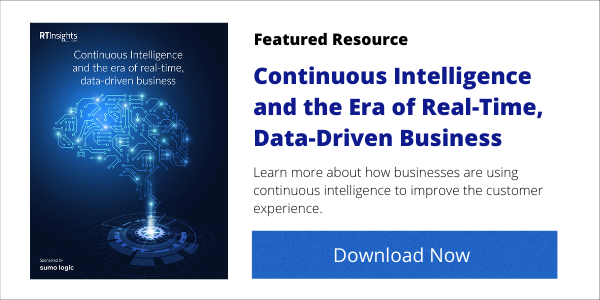
As gaming companies struggle to balance security, user experience, and performance, continuous intelligence could be the path forward.
As games and gaming platforms become more complex and drive more revenue, companies are under increasing pressure to deliver seamless yet secure customer experiences. Many are looking to continuous intelligence (CI) to help navigate matters and improve operations. However, challenges in the market may be keeping gaming organizations from stepping fully into the potential continuous intelligence has.
Why gaming needs continuous intelligence
Continuous intelligence is a machine-driven approach to harnessing the power of data for insights. It can process massive data inputs in real-time, placing organizations in a position to pivot quickly and scale as necessary.
Featured Resource: Continuous Intelligence and the Era of Real-Time, Data-Driven Business [Download Now]
The gaming industry relies on cutting-edge technology to deliver fantastic customer experiences. That hasn’t changed from the very first Atari consoles, but the sheer number of machines, devices, and systems on the network has changed the rules for the industry. Gaming companies must account for this inconsistency without sacrificing a seamless experience to take full advantage of the market.
Gaming also requires high-performance standards, no matter how many devices access the network. These market pressures require a different processing solution for gaming companies looking to distinguish themselves in a crowded market.
See also: Continuous Intelligence Insights
Challenges in the industry
Gaming presents some unique challenges that traditional operating systems cannot address. Let’s explore some of the biggest issues facing the gaming industry today in terms of technological logistics.
- Lack of visibility: The gaming industry is fragmented, storing and deploying products across many different systems. Troubleshooting problems requires accessing a multitude of different logs. The industry needs a central command to solve issues quickly.
- Lack of scalable investigation: When problems happen, gaming can respond, but it often misses the “why” behind these disruptions. Gaming companies need tools that can leverage big data to uncover insights in minutes, not hours.
- Lack of pipeline support: Gaming companies operate on DevOps principles, requiring rapid updates and software release. Too much manual monitoring of these pipelines leads to wasted developer time and slower issue resolution.
- Lack of robust security: Gaming companies are entrusted with highly sensitive data. New game frameworks must operate from a security-first principle that maintains compliance without overly restricting game access.
- Lack of scalability: Games don’t operate with the same clear trajectory. Gaming companies experience bursts of unpredictable data ingest, and they need a solution that doesn’t penalize them.
Continuous intelligence addresses these challenges by providing an intelligent pipeline for data analysis that speeds resolution time. It offers the kind of scalable solution gaming companies need to maintain a constant cycle of development and compliance without lags in gameplay.
To implement CI in the gaming industry, companies need:
- Self-provisioning SaaS with low to no maintenance
- Algorithms for advanced analytics, i.e., machine learning models.
- Out of the box integrations for fast implementation
- Security first integrations for compliance (GDPR, etc.)
- Flexible licensing
Benefits of Continuous Intelligence
CI offers several benefits for the overall customer experience—something gaming companies need to remain relevant.
- Seamless experiences: Centralizing monitoring and analysis ensure issues resolve quickly, and companies can execute updates without delay.
- Robust security: CI analysis finds security breaches faster with fewer false positives.
- Accelerate innovation: With machine learning support, developers can better push updates and new products on a faster timeline.
- Continuous monitoring: Automating monitoring removes complexity and facilitates the DevOps cycle for gaming.
CI is foundational for gaming innovation
Continuous intelligence facilities the ideals of the gaming industry in a complex, massive data-driven world. As companies struggle to balance privacy and security compliance with real-time updates and seamless customer experiences, continuous intelligence could be the path forward.







